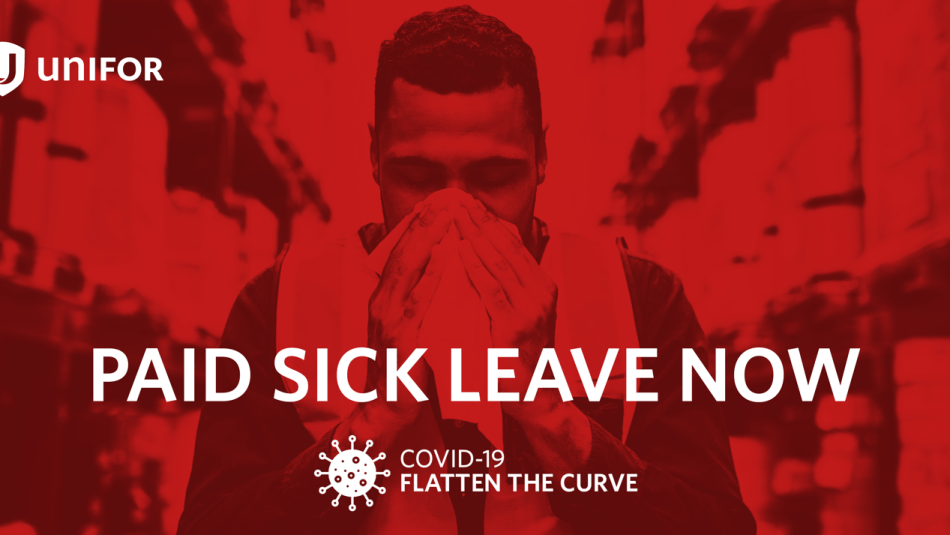
Share
We are living in unprecedented times. The window to flatten the curve is closing fast, and so is the opportunity to minimize the economic fallout of a pandemic. COVID-19 has created an uncertain and challenging situation for all working people, including Unifor members across Canada.
In hospitality and gaming, education, retail, airlines and more, we are facing mass layoffs. Health care workers, already pushed to the breaking point, are preparing to bravely treat patients of this pandemic, and prevent further spread in long-term care homes. In many sectors, including transportation and telecommunications, in grocery stores and pharmacies, vital work continues and workers need protection.
Unifor has created a task force, led by National Secretary-Treasurer Lana Payne, to provide you the latest information, including our list of demands from government to keep you healthy, and to mitigate financial hardship.
Resources
The webpage unifor.org/covid19 is your one-stop hub for union information about the pandemic. For Quebec updates please visit : www.UniforQuebec.org/COVID19. You will find resources and new, printable, sector specific information sheets along with regular updates from the task force.
Unifor has adopted an all-hands-on-deck approach to supporting members during these challenging and uncertain times. We have worked every day to answer questions, communicate with employers, and call on governments to flatten the curve and respect working people in this time of crisis.
If you have questions about EI sickness benefits, work absences, in-person meetings, and refusing work - we have answers. Read our Frequently Asked Questions on COVID-19.
For the latest public health information, contact your local health agency, listed here on our resources page.
We have also compiled a COVID-19 Checklist for income replacement that sets out the possible measures that may be available for income replacement during COVID-19-related work absence due to self-isolation, quarantine or family care obligations, and layoff or business closures.
Protecting Workers
Unifor’s position is that federal and provincial governments are not acting fast enough to properly stop the spread of the coronavirus before our health care system is completely overrun, and before more Canadians get sick.
Jerry Dias wrote to the federal government on March 12 to make key demands that would protect workers.
Without the adequate response measures in place, too many workers will face a difficult choice between going to work while sick and making ends meet.
Our demands of all levels of government are:
- Institute a minimum of 14 days of paid sick leave whether a worker has been formally quarantined by a health official, or been asked to self-isolate
- Establish special provisions that provide workers paid leave to care for children affected by government-mandated school and daycare closures
- Establish direct, emergency income assistance measures to all workers and families –
including those ineligible for Employment Insurance benefits
Federal Demands:
- Waive the one-week waiting period for regular Employment Insurance benefits and temporarily eliminate the qualifying hours needed to access benefits to ensure more workers – especially vulnerable workers in the hospitality, tourism and retail sectors – have access in the event of job displacement
- Waive the EI regular benefit requirement for seven consecutive days without work or wages in the previous 52 weeks to provide workers suffering from reduced work-hours access to EI benefits
- Increase the duration of EI sick leave from 15 to 26 weeks
- Waive the one-week waiting period for EI sickness benefits, which the Federal Government announced on March 11
- Waive the hours requirement for EI sickness benefits and the requirement for a medical certificate
- Expand EI coverage to include workers who are caring for children affected by mandatory school, daycare and other child care facility closures
- Implement emergency special income assistance payments to vulnerable workers (including precarious workers, and independent contractors), who otherwise would not receive EI benefits
- Introduce special “income relief” measures for full-time and part-time workers in the health care sector (as was done during the SARS outbreak), who are more susceptible to contracting COVID-19
- Ease federal Work-Sharing rules, to maximize eligibility, and enhance benefits to mitigate job losses especially within vulnerable sectors (like tourism). The federal government should actively promote work-sharing across workplaces, and commit to accelerating the approval process (Federal Government announced enhanced Work-Sharing, extended eligible weeks from 38 to 76)
- All jurisdictions should waive requirements for employees to produce doctor’s notes in cases of illness (at the very least, consider other less onerous ways to substantiate absences due to illness)
- Provide special assistance to workers returning from maternity and parental leave who have exhausted their EI benefits and do not have enough hours to cover lay off benefits
- Implement enhanced EI or other wage replacement measures that accommodate those workers whose income is partially derived from gratuities, including those employed in hospitality, gaming, and the taxi industry
- Service Canada must issue a directive to employers to code layoffs as “Layoff/Shortage of Work” instead of “other” to ensure no administrative bottlenecks prevent impacted workers from receiving money
- Expand the number of Service Canada staff in order to process claims in a timely manner
- Staff should be hired and on-boarded immediately, given the extreme demands placed on the system.


